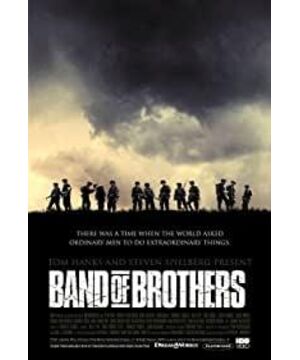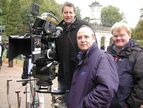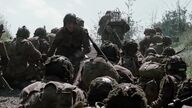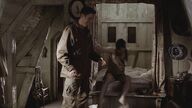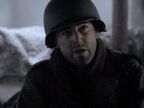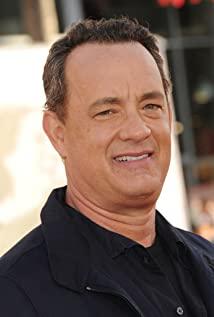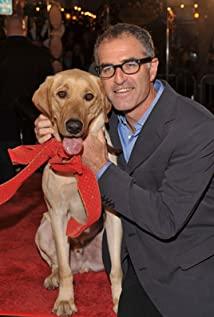In terms of plot load, the third episode of "Brothers" is the most informative of all TV series I have seen, and it has strong independence and strict logic. It is enough to extract the content from the whole series separately. Compared with many movies of the same type.
In terms of characters, according to the conventions of American dramas, a large number of protagonists and supporting characters began to appear. The looming officers and soldiers in this episode had their own roles. For the "Brothers Company", which has more than 500 characters with lines, let the audience remember The information for everyone is really difficult. The uniform dress first made the audience a little confused. Because the time and space span of this episode requires a large number of protagonists, the director adopted the method of one protagonist running through, so that the audience can have a A character that is completely remembered from beginning to end-Albert Blithe. This is a character somewhat similar to Urban in "Saving Private Ryan". His fear is full of his psychology and his performance is particularly exaggerated. In general, the first intention of the director is that his character has been confused from the beginning to the hysterical. Finally, overcome fear and become a warrior, presenting a hero's birth process. In this way, Albert Blithe takes the audience from Carrington to the jungle and then to the hospital, forming a complete clue to a complete plot of this episode.
Just now I mentioned that the first layer of the character Albert Blithe appeared was "heroism." Although it was explained at the end that he was still dying of illness a few years later, it is clear that the character's mission in the story is definitely more than just such an empty and sad regret. Here comes the second meaning: fear.
It can be said that fear is the theme emotion of this episode, not only because of the character Albert Blithe, but as mentioned in the episode of the veteran’s memories at the beginning, and revealed by the conversation between the characters in the film, on the battlefield, no matter what Was it the thinking between the battles or the arrogance during the battle. The mantra of those soldiers who are good at thinking is "life and death." They either died in Normandy or returned home unscathed. It can be said that this is almost a kind of Christian origin. Idealist thinking, but on the battlefield, is the only way to inspire oneself. Note that there has been no propaganda of patriotism or too much personal heroism in the brotherhood, but the story of "people" has been truly told. At that time, the two sides of many human natures began to show up. The most typical is the officer who shot and killed a group of German prisoners in the second episode. In this episode, the soldiers began to face the violation of the Geneva Convention and received mixed reviews, but The audience’s intuition will definitely feel that this person is psychologically problematic, or that he is a racist who is deeply influenced by one-sided patriotism, but in the subsequent plot, from caring about Albert Blithe who was just in shock to the words of caring for soldiers in the back, we found out, This is just like General Patton, an ordinary person who sees through the war and enjoys killing but is extremely frightened. This pair of contradictions seems unacceptable, but in the context of the entire war, it seems insignificant.
There are several scenes in this episode that are very impressive, and they have naturally become the classic propaganda film of "Brothers":
1. In the first battle of Carrington, American soldiers blasted a wall with bazooka. The fate of the German paratroopers can be imagined. At this time, a surviving German paratrooper staggered out of the smoke, holding a gun in one hand, holding both hands, and shouting "I surrender." Fired a pistol and shot on the spot mercilessly. When shooting this shot, the director used a panoramic view of the street. Two soldiers were arranged symmetrically on both sides of the screen. The foreground was gunpowder. He used slightly exaggerated sound effects and slow motion to highlight the action, but did not follow it. The plot is supplemented or lyrical, which once again reflects the director's human care for every soldier, including the Germans.
2. In the bush attack and defense battle, Albert Blithe was picked up by Wintesla to shoot at the German defense. He had been cowardly before and shot his gun for the first time. His wide glasses showed a ruthless murderous intent, and more It was an affirmation of overcoming himself. He raised his Garland and shot it bang-bang. The director used a dazzling special effects lens to highlight the firing pin sound of Garand’s automatic rifle. The rotation in the air has become the most common propaganda picture of the show. In fact, this scene doesn't show much significance for a serious narrative except for the dazzling looks.
Regarding the warriors, the peripheral products that emerged during this war were proposed in a nearly cruel way. When the United States entered the war, the German troops had gone through the European war for more than two years and had rich combat experience. Objectively speaking, the tenacious fighting spirit of the ace troops born in the German military has become something that the US military worships and respects. Otherwise, why the US military Soldiers are willing to collect trophies in the play many times, including Nazi flags and camouflage raincoats. In this episode, as a duel between the two paratroopers, the most elite force is the German paratroopers, which has experienced almost all major battles in the Third Reich. The German paratroopers in this episode are elite soldiers who have participated in the alpine battle. Many soldiers don’t have edelweiss picked from the Alps on their collars-as Winters said, he can really climb Defeating the enemy at such a high place and picking it, this is the real hero. So, when the bush fight was over, Albert Blithe came to the German position to check the German paratrooper he had shot, and he put the edelweiss on his body on his collar as a matter of course-if this was used to explain why he wanted to It’s okay to hang up—this is an irreplaceable spirit about real heroes—it’s also a kind of human care. What we have to remember is all heroes. The victor cannot erase the spirit of the loser.
Let’s talk about the very eye-catching armored vehicles in this episode. Because of the face of the two major producers, "Brothers" got rid of the practice of replacing World War II vehicles with modern armored vehicles in many war films, and used restoration and reconstruction to show many models. German vehicles-sd.kfz.251, sd.kfz.222, Cheetah tank killer (there were very few installed at the time, it can be seen how elite armored units E Company faced), the No. 4 assault gun, and it seems that there are Leopards Type tank! Relatively speaking, the U.S. M4 Sherman tanks that came out of the rescue field were really ugly... When these vehicles were charged alive, it really made a lot of military fans like me really addicted.
As I said before, this episode really carries too much emotion in it. Even after watching it twice, I still missed a lot of things. I hope everyone will notice what I have noticed when watching this episode. Yes, those who have different opinions also come to correct me. In this way, I am ready to watch the market garden action.
View more about Band of Brothers reviews


